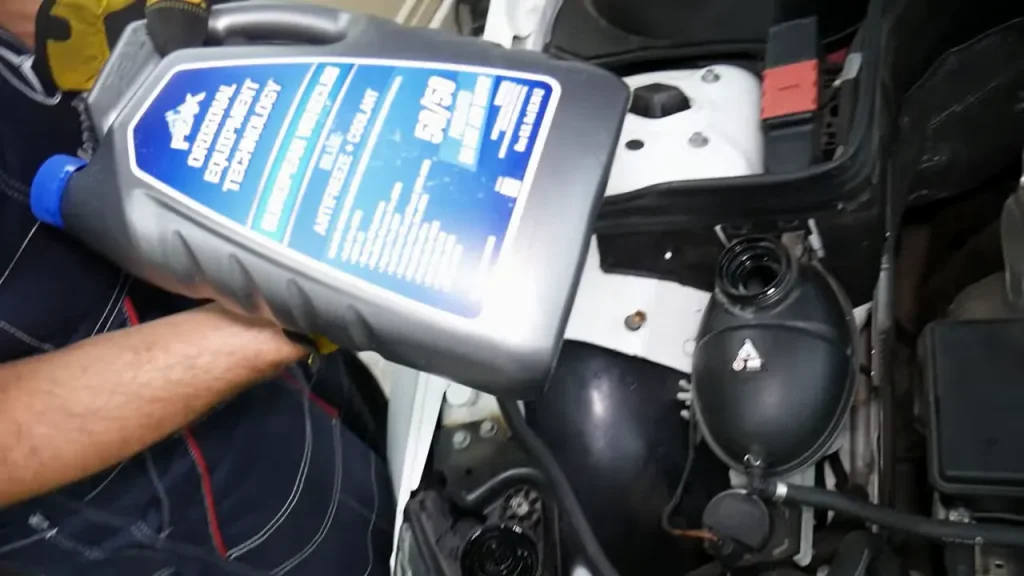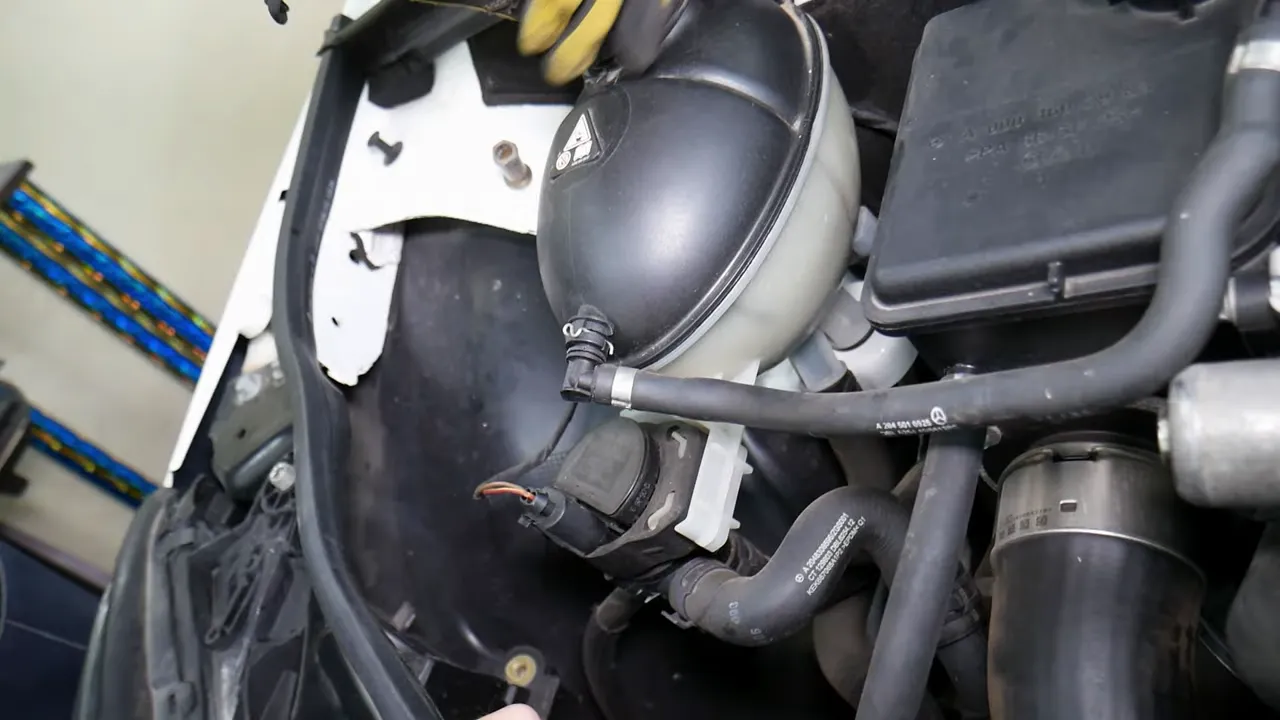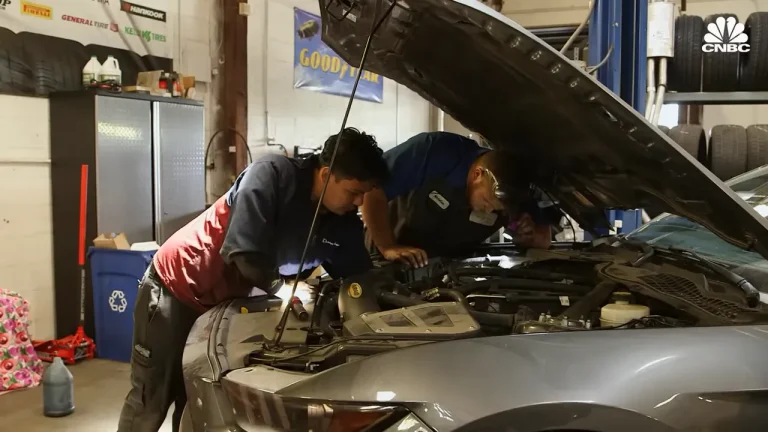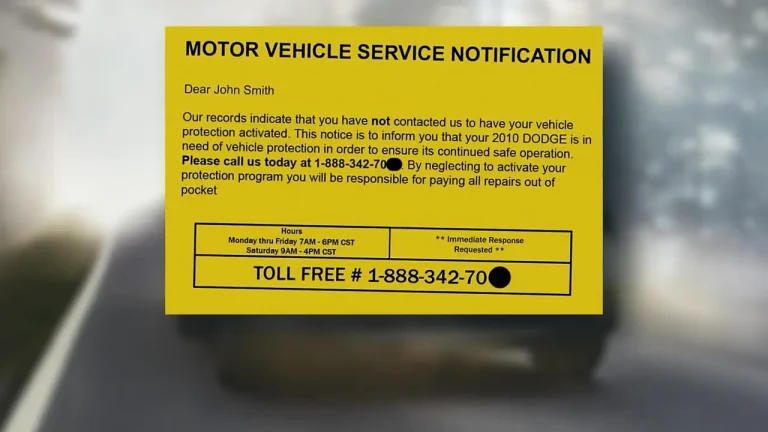Coolant Or Antifreeze Spilled On Engine? (What To Do)
Coolant or antifreeze is an integral component of a vehicle’s cooling system, playing a crucial role in preventing engine overheating and maintaining optimal operating conditions. However, accidents can happen, and spills of coolant or antifreeze onto the engine can occur, posing potential risks and consequences.
In this blog post, we will provide you with a comprehensive guide on dealing with coolant or antifreeze spills on the engine. Whether you’re a seasoned car enthusiast or a novice driver, it’s essential to understand the necessary steps to take in such situations to minimize damage and ensure your safety.
We’ll start by discussing the importance of personal safety precautions, emphasizing the need for protective gear and working in a safe environment. Next, we’ll delve into the immediate response required after a spill, including shutting off the engine and allowing it to cool down. Then, we’ll guide you through the process of assessing the damage and cleaning up the spilled coolant or antifreeze effectively.
Furthermore, we’ll explore potential engine damage that may result from such spills and provide insights on how to address and prevent further issues. By following our expert advice, you’ll be equipped with the knowledge and confidence to handle coolant or antifreeze spills like a pro, safeguarding your engine’s longevity and performance.
What Should I Do If I Spill Coolant on the Engine?

Safety Precautions
When dealing with coolant or antifreeze spills, it’s essential to prioritize safety. Here are some key safety precautions to follow:
1. Personal Protective Equipment (PPE): Wear appropriate protective gear, including gloves, safety goggles, and a long-sleeved shirt, to protect yourself from potential skin irritation or eye contact with the spilled fluid.
2. Ventilation: Work in a well-ventilated area or open space to avoid inhaling potentially harmful fumes. If working indoors, ensure proper ventilation through open windows or use of fans.
3. Engine Cooling: Before attempting any cleanup, turn off the engine and allow it to cool down. Hot surfaces can cause burns, so it’s crucial to let the engine reach a safe temperature.
4. Fire Safety: Coolant and antifreeze are flammable substances, so avoid open flames, sparks, or smoking near the spill area. Minimize any potential fire hazards by removing ignition sources.
5. Containment and Cleanup: Use absorbent materials like cat litter or sawdust to contain and absorb the spilled coolant or antifreeze. Avoid spreading the liquid to prevent environmental contamination.
6. Disposal: Dispose of the contaminated materials according to local regulations. Coolant and antifreeze should not be poured down drains, as they can harm the environment. Look for proper disposal methods, such as recycling centers or designated collection sites.
Immediate Response
When faced with a coolant or antifreeze spill on the engine, it’s crucial to take immediate action. Here’s what you should do:
1. Shut off the Engine: Turn off the engine as soon as possible to prevent further circulation of the coolant or antifreeze. This helps minimize potential damage and reduces the risk of overheating.
2. Allow Cooling Time: Give the engine sufficient time to cool down before attempting any cleanup. Hot engine components can cause burns, so exercise caution and wait until the temperature has significantly reduced.
3. Personal Safety First: Put on appropriate personal protective equipment, including gloves and safety goggles, to protect yourself from contact with the spilled fluid. Ensure you are working in a safe and well-ventilated area.
4. Assess the Spill: Take a moment to evaluate the extent of the spill and identify any potential areas of concern. Look for signs of pooling coolant or antifreeze, leaks, or damage to surrounding components.
5. Contain the Spill: Use absorbent materials, such as rags, towels, or absorbent pads, to contain and soak up the spilled coolant or antifreeze. Start from the outer edges of the spill and work your way inward to prevent further spreading.
6. Proper Disposal: Dispose of the contaminated absorbent materials and spilled fluid in accordance with local regulations. Avoid pouring coolant or antifreeze down drains or on the ground, as it can harm the environment.
Assessing the Damage
After a coolant or antifreeze spill on the engine, it’s important to assess the potential damage. Here’s how to evaluate the situation:
1. Visual Inspection: Carefully examine the engine and surrounding components for signs of damage. Look for coolant residue or pooling in areas where the spill occurred.
2. Electrical Components: Check electrical connections, wiring, and sensors near the spill area. Coolant or antifreeze can cause corrosion and damage to electrical components, potentially leading to malfunctions or failures.
3. Belts and Hoses: Inspect belts and hoses for any signs of degradation, swelling, or softening. Coolant or antifreeze exposure can cause these rubber components to deteriorate, resulting in leaks or loss of functionality.
4. Leaks: Look for any visible leaks originating from hoses, gaskets, or other engine parts. Coolant or antifreeze spills can exacerbate existing leaks or create new ones, which can affect the engine’s performance and coolant system efficiency.
5. Unusual Engine Behavior: Pay attention to any abnormal engine behavior, such as overheating, rough idling, or loss of power. These symptoms may indicate underlying damage caused by the spill.
6. Professional Inspection: If you’re uncertain or notice significant damage, consider seeking assistance from a professional mechanic. They can provide a thorough evaluation, identify hidden issues, and recommend appropriate repairs or replacements.
Cleanup and Containment
Cleaning up and containing a coolant or antifreeze spill on the engine is important to prevent environmental contamination and maintain the engine’s health. Here’s how to effectively handle the cleanup process:
1. Safety Precautions: Put on protective gloves and safety goggles before starting the cleanup. This protects your skin and eyes from potential contact with the spilled coolant or antifreeze.
2. Absorb the Spilled Fluid: Use absorbent materials like rags, towels, or absorbent pads to soak up the spilled coolant or antifreeze. Begin by placing the absorbent material around the edges of the spill and work your way toward the center.
3. Contain the Spill: To prevent further spreading, create a barrier using absorbent materials or containment booms. This helps keep the fluid in a confined area and prevents it from reaching other parts of the engine or the environment.
4. Wipe Down the Engine: Use clean rags or towels to wipe down the affected areas of the engine. Remove any remaining coolant or antifreeze residue from engine surfaces and components.
5. Disposal of Contaminated Materials: Properly dispose of the used absorbent materials and any remaining spilled fluid. Check local regulations for guidelines on disposing of coolant or antifreeze. Avoid pouring it down drains or on the ground, as it can harm the environment.
6. Rinse with Water (if necessary): In some cases, a gentle rinse with water may be required to remove stubborn coolant or antifreeze residue. However, be cautious not to introduce excessive water into sensitive engine components.
7. Final Inspection: After cleanup, visually inspect the engine and surrounding areas to ensure all traces of coolant or antifreeze have been removed. Look for any signs of remaining spills or leaks.

Addressing Potential Engine Damage
Addressing potential engine damage resulting from a coolant or antifreeze spill is crucial to ensure the engine’s proper functioning. Here are some steps to consider:
1. Professional Evaluation: If you suspect significant damage or are unsure about the extent of the impact, it’s advisable to consult a professional mechanic. They can conduct a thorough assessment and provide expert guidance on necessary repairs or replacements.
2. Repairing Leaks: If the spill has caused leaks in hoses, gaskets, or other engine components, these should be repaired promptly. Leaks can lead to coolant loss and engine overheating. Replace damaged hoses or gaskets and ensure proper sealing to prevent further issues.
3. Flushing the Cooling System: Contaminated coolant or antifreeze can cause buildup or blockages within the cooling system. Consider flushing the system to remove any residue or impurities. Flushing may require draining the coolant, introducing a cleaning solution, running the engine to circulate it, and then flushing with clean water.
4. Checking for Corrosion: Coolant or antifreeze spills can cause corrosion on various engine parts, such as metal surfaces or electrical connections. Inspect these areas for signs of corrosion, such as rust or greenish deposits. Clean and treat affected surfaces accordingly.
5. Component Replacement: Depending on the severity of the damage, certain engine components may need replacement. This could include damaged belts, hoses, connectors, or electrical components that have been compromised by the coolant or antifreeze spill.
6. System Pressure Test: Perform a system pressure test to ensure the cooling system’s integrity and identify any hidden leaks or weaknesses. This test can help identify potential issues before they lead to more significant problems.
7. Regular Maintenance: After addressing the immediate damage, prioritize regular maintenance to keep your engine in optimal condition. This includes monitoring coolant levels, inspecting hoses and belts, and following manufacturer-recommended service intervals for coolant replacement.
Preventive Measures
Taking preventive measures is key to minimizing the risk of coolant or antifreeze spills on the engine. Here are some preventive steps to follow:
1. Regular Inspection: Routinely inspect the cooling system for any signs of leaks, cracks, or worn-out hoses. Look for corrosion or damage to connectors, gaskets, and other components. Address any issues promptly to prevent potential coolant or antifreeze spills.
2. Coolant Level Checks: Monitor the coolant or antifreeze levels regularly. Low coolant levels can lead to overheating, which increases the risk of spills. Ensure the coolant is at the appropriate level and top it up as needed, following the manufacturer’s guidelines.
3. System Pressure Test: Periodically perform a system pressure test to check for leaks or weaknesses in the cooling system. This test helps identify potential problems before they escalate and cause spills. Consider having this test performed during routine maintenance.
4. Coolant Replacement: Follow the manufacturer’s recommendations for coolant replacement intervals. Over time, coolant can lose its effectiveness and become more prone to causing spills or engine damage. Regular coolant replacement helps maintain the cooling system’s efficiency.
5. Proper Storage and Handling: Store coolant or antifreeze in a secure and designated area, away from direct sunlight and extreme temperatures. Follow the manufacturer’s instructions for handling, storing, and disposing of these substances properly.
6. Educate Yourself: Stay informed about your vehicle’s cooling system and its specific requirements. Familiarize yourself with the warning signs of coolant or antifreeze leaks or system malfunctions. Being proactive and knowledgeable can help you identify potential issues early on.
7. Professional Maintenance: Schedule regular maintenance with a trusted mechanic or dealership. They can perform comprehensive inspections, address any underlying issues, and ensure the cooling system is in good working condition.
Frequently Asked Questions
Q: What should I do if coolant or antifreeze spills on my engine?
A: If a coolant or antifreeze spill occurs, it’s important to take immediate action. Shut off the engine to prevent further circulation of the fluid and let it cool down. Put on personal protective equipment and assess the extent of the spill. Use absorbent materials to clean up the spilled coolant or antifreeze and properly dispose of the contaminated materials. It’s also recommended to inspect the engine for any signs of damage and consider seeking professional help for repairs if needed.
Q: Can a coolant or antifreeze spill cause engine damage?
A: Yes, a coolant or antifreeze spill can potentially cause engine damage. Coolant or antifreeze can corrode engine components, leading to leaks, clogs, or malfunctions. Additionally, if the spill causes overheating, it can result in engine damage. It’s crucial to address spills promptly, assess the damage, and take necessary measures to prevent further issues.
Q: How do I clean up a coolant or antifreeze spill?
A: To clean up a coolant or antifreeze spill, put on protective gloves and use absorbent materials like rags or towels to soak up the spilled fluid. Begin from the outer edges and work your way inward to contain the spill. Dispose of the used absorbent materials properly, following local regulations. Wipe down the engine to remove any remaining residue. If necessary, rinse with water, but be cautious not to introduce excessive water into sensitive engine components.
Q: Can I dispose of coolant or antifreeze down the drain?
A: No, it is not recommended to dispose of coolant or antifreeze down the drain. These fluids contain toxic chemicals that can harm the environment. Instead, check local regulations for proper disposal methods. Many communities have recycling centers or designated collection sites for coolant or antifreeze. Improper disposal can lead to pollution of water sources and damage to ecosystems.
Q: How can I prevent coolant or antifreeze spills on the engine?
A: To prevent coolant or antifreeze spills, regularly inspect the cooling system for leaks or worn-out components. Check coolant levels and top up as needed. Perform system pressure tests to identify potential weaknesses. Follow manufacturer-recommended coolant replacement intervals. Store and handle coolant or antifreeze properly. Educate yourself about your vehicle’s cooling system and its requirements. And, don’t skip routine maintenance, as professional inspections can help catch issues before they escalate.
Q: Is it necessary to seek professional help after a coolant or antifreeze spill?
A: While minor spills can often be handled by following the appropriate cleanup procedures, it is advisable to seek professional help if you’re uncertain about the extent of the damage or if significant leaks or engine issues are detected. A qualified mechanic can perform a thorough evaluation, provide accurate diagnosis, and recommend necessary repairs or replacements to ensure the proper functioning of the engine and cooling system.
- Why Are My Car Headlights Not Bright Enough? - May 9, 2024
- How Long Can You Drive With An EVAP Leak? - May 9, 2024
- What Does B Stand for in a Car? [Full Guide] - May 9, 2024





![Why Car Temperature Gauges Fluctuate While Driving [Ultimate Guide]](https://automhelp.com/wp-content/uploads/2023/07/Car-Temperature--768x461.png)